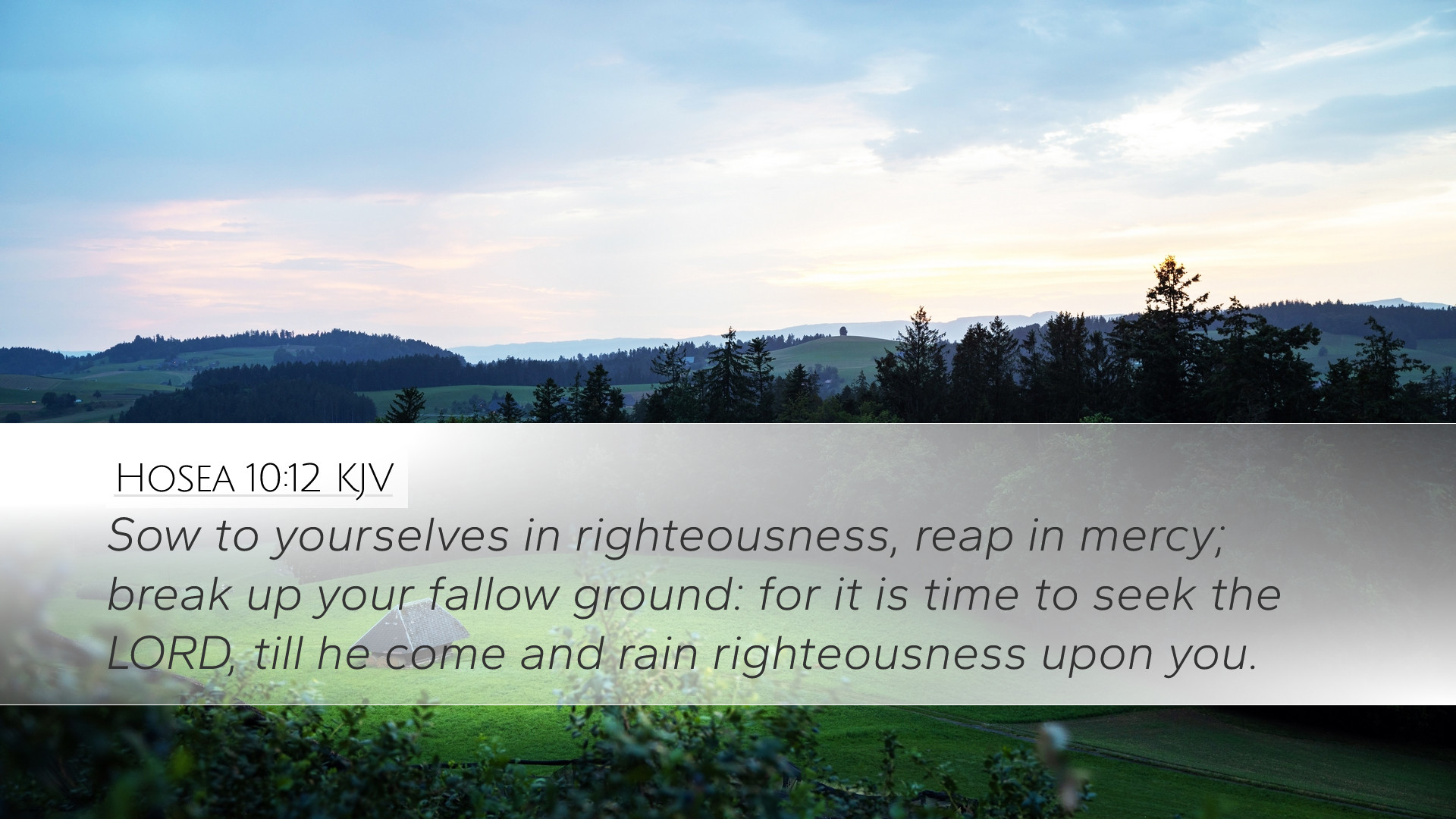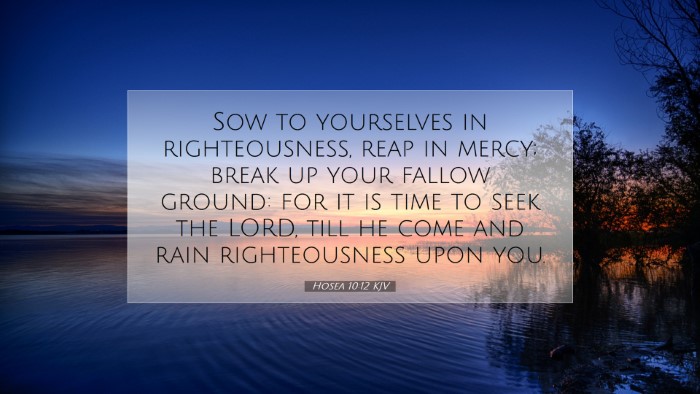Old Testament
Genesis Exodus Leviticus Numbers Deuteronomy Joshua Judges Ruth 1 Samuel 2 Samuel 1 Kings 2 Kings 1 Chronicles 2 Chronicles Ezra Nehemiah Esther Job Psalms Proverbs Ecclesiastes Song of Solomon Isaiah Jeremiah Lamentations Ezekiel Daniel Hosea Joel Amos Obadiah Jonah Micah Nahum Habakkuk Zephaniah Haggai Zechariah MalachiHosea 10:12
Hosea 10:12 KJV
Sow to yourselves in righteousness, reap in mercy; break up your fallow ground: for it is time to seek the LORD, till he come and rain righteousness upon you.
Hosea 10:12 Bible Commentary
Commentary on Hosea 10:12
Hosea 10:12 states: "Sow to yourselves in righteousness, reap in mercy; break up your fallow ground: for it is time to seek the LORD, till he come and rain righteousness upon you." This verse encapsulates deep spiritual truths that are crucial for understanding the relationship between human actions and divine blessings. Below is a synthesis of insights from public domain commentaries, aimed at edifying pastors, students, theologians, and Bible scholars.
Contextual Background
Hosea, a prophet in Israel, delivered messages from God at a time of moral decay and spiritual apostasy. His prophetic words frequently call the people to repentance and a return to righteousness. Hosea 10:12 appears in a context where Israel is being urged to turn away from their sinful ways and to seek the Lord earnestly.
The Imperative to Sow
Sow to yourselves in righteousness emphasizes the need for intentionality in one's spiritual pursuits. Matthew Henry notes that the act of sowing implies a need for preparation and a purposeful effort towards cultivation of spiritual fruit.
- Righteousness as Sowing: Righteous actions lead to a harvest. The principle is clear: what one invests in spiritually will yield a corresponding return.
- Personal Responsibility: The phrase "to yourselves" indicates personal accountability in the pursuit of righteousness. Each individual is called to align their actions with God's will.
The Promise of Mercy
The latter part of the verse, reap in mercy, is an assurance that the fruit of righteousness is mercy. According to Albert Barnes, this suggests that the result of sowing righteousness is not only a return on moral investment but also divine mercy and favor.
- The Nature of Mercy: Mercy signifies compassion and grace from God, reflecting His character towards those who seek Him genuinely.
- Forgiveness and Restoration: Through repentance and righteous living, one can expect restoration in their relationship with God.
Breaking Up Fallow Ground
Break up your fallow ground presents an agrarian metaphor relevant to the audience of Hosea’s time. Adam Clarke elaborates that fallow ground represents areas of life that have been neglected or allowed to become hard and unproductive.
- Spiritual Preparation: Before sowing, the ground must be tilled. This denotes the necessity of personal introspection, repentance, and a desire for spiritual renewal.
- Overcoming Obstacles: Fallow ground can symbolize barriers that hinder spiritual growth, such as sin, complacency, or disobedience. The call to break up such ground challenges individuals to confront and remove these hindrances.
The Call to Seek the Lord
The phrase for it is time to seek the LORD indicates urgency. The prophets often remind their audience of the importance of immediacy in seeking God, especially in times of distress and moral failure. Henry suggests that this seeks to instill a sense of priority in one’s life.
- The Importance of Seeking: Seeking the Lord involves active pursuit, prayer, and engagement with God’s Word.
- A Response to Divine Invitation: God calls His people to seek Him, implying that He desires a relationship with those who turn to Him.
The Blessing of Righteousness
Hosea concludes with till he come and rain righteousness upon you. This imagery of rain signifies renewal, fertility, and the blessings of God’s presence. Barnes notes that the rain can be seen as both a gift and a reminder of God’s providence.
- Righteousness as a Gift: The coming rain is portrayed as a divine act of grace, highlighting that righteousness is not solely a human endeavor but is also a divine bestowment.
- Spiritual Awakening: The outpouring of righteousness indicates a time of rejuvenation and revival for those who seek God earnestly.
Practical Applications
For pastors, students, and theologians, Hosea 10:12 serves as a profound reminder of the cyclical nature of sowing and reaping in the spiritual realm. The following applications can be drawn:
- Encourage Personal Holiness: Emphasize the importance of individual actions that align with God’s righteousness in sermons and teachings.
- Foster a Community of Prayer: Create an environment that encourages seeking the Lord collectively, emphasizing communal prayer and repentance.
- Promote Spiritual Discernment: Aid believers in understanding the areas of their lives that require breaking up fallow ground—neglected spiritual practices, unconfessed sin, or disobedience.
- Celebrate the Gifts of Grace: Remind congregants of the grace of God that rains down upon those who earnestly seek Him, highlighting stories of transformation and revival.
Conclusion
Hosea 10:12 encapsulates both an urgent call to righteousness and the profound mercy available through God’s grace. The insights from noted commentators lend depth to the understanding of this scripture and encourage all believers to actively engage in sowing a life characterized by fidelity to God’s commands. As the faithful sow in righteousness, they can trust in God’s faithful promise to rain down righteousness upon them.


